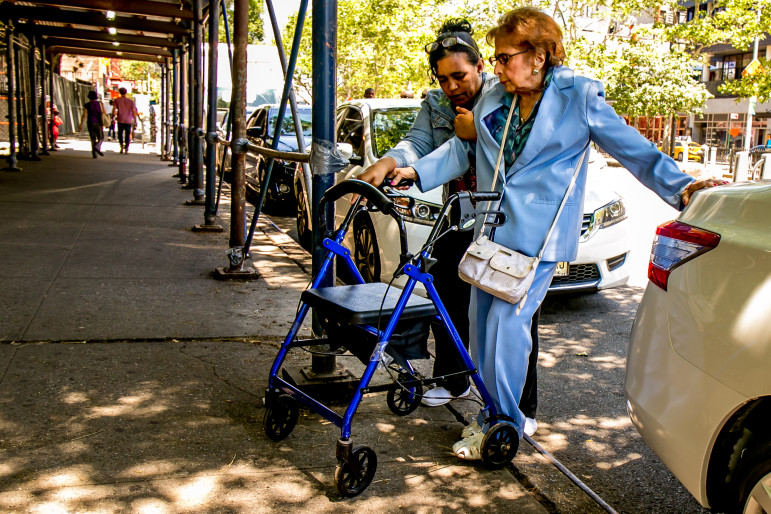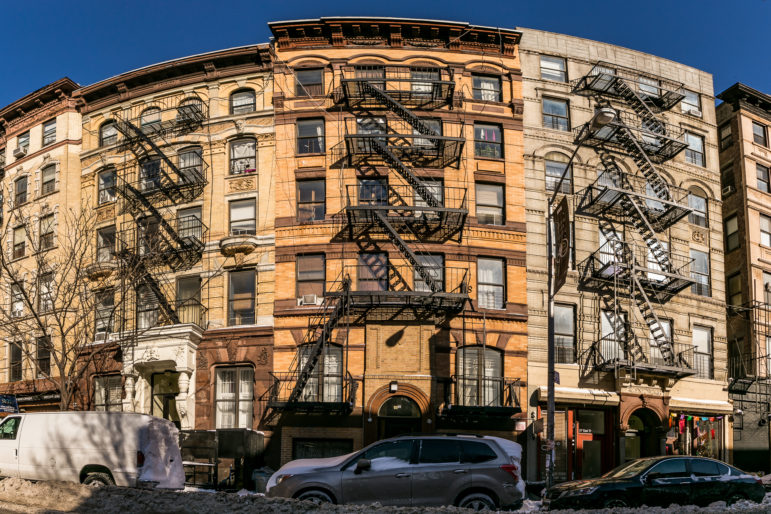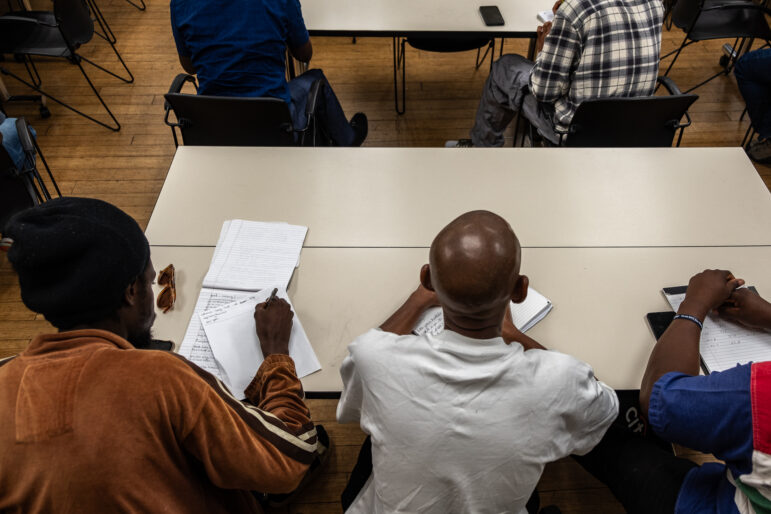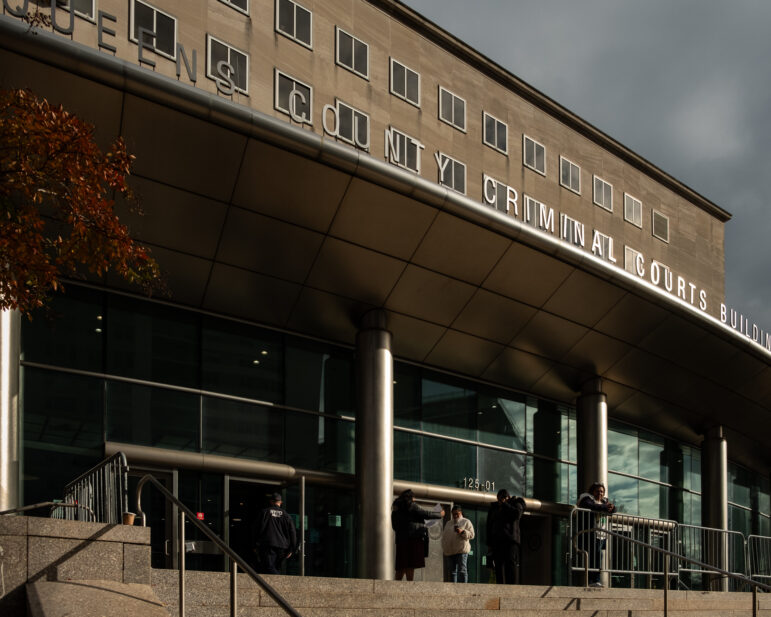‘The cost is too high not to fund safety modifications to our housing stock. Older adults who can’t afford modifications, such as grab bars or no step entrances, must choose between living in an unsafe home or moving to an institutional setting.’

Adi Talwar
A woman and her caregiver on the way to a senior center in lower Manhattan, prior to the pandemic.With a record 1.2 million seniors residing in the five boroughs, the City Council has a mandate to engage with older adults and remake our city together. When I gave public testimony at the joint hearing for the Council’s Committees on Immigration and Aging, I shared the intersectionality of what it means to be a daughter of a senior who is still working without a pension in New York City. The story of my father and his struggle to maintain his small business and our home as a taxi driver is the story of many seniors across this city. When elected, I will center how our policies across the city impact seniors’ access to affordable housing and social services.
According to an AARP study, 90 percent of older adults prefer to age in their homes as opposed to moving into institutional settings. Unfortunately, our housing stock is woefully inadequate to accommodate this preference. Since the vast majority of safety modifications are paid out-of-pocket, they are often out of reach for low-income seniors. I am advocating for a city-funded program to provide grants and loans to low-income seniors to fund accessibility improvements.
READ MORE: More New Yorkers are ‘Aging in Place’—But Growing Older at Home Isn’t Easy
The cost is too high not to fund safety modifications to our housing stock. Older adults who can’t afford modifications, such as grab bars or no step entrances, must choose between living in an unsafe home or moving to an institutional setting. Those living in unsafe housing are at particular risk for falls, the leading cause of hospitalization for older adults. Falls result in preventable harm and an annual tax payer funded bill of $722 million. The alternative to living in an unsafe house is to leave the community for a nursing home, which can cost up to $164,000 per year.
 CityViews are readers’ opinions, not those of City Limits. Add your voice today!
CityViews are readers’ opinions, not those of City Limits. Add your voice today!
Cities around the country, including Washington D.C. and Chicago, recognize the importance of upfront investment to create safe, livable homes. These policy models prove that funding renovations ultimately saves taxpayer money and allows older adults to stay in their communities. Any modifications made to our housing stock has the added perk of benefitting future generations as well.
To ensure seniors stay in their communities, we must also abolish policies that evict seniors and perpetuate harm to vulnerable families. One such policy is the tax lien sale. Every year, homeowners who fall behind on their tax or water bills get intertwined in the city’s lien sale. The tax lien sale is a process by which the city sells the debt that a homeowner owes to private investors. These investors add fees and interest to the debt. Some homeowners can see their debt double in as little as a year. The debt continues to grow until the homeowner either pays it off, or the investor forecloses on the house and evicts the owner. Wall Street investors make a handsome profit, while low-income New Yorkers sink into precarious circumstances.
The impact of the tax lien sale is unevenly felt around the city. Communities of color are hardest hit. The city is six times more likely to sell a lien in a majority Black neighborhood than a majority white neighborhood. Seniors are also extremely vulnerable in this system. Some seniors are exempt from the lien sale but may not realize it, and many still fall through the cracks. If I am elected to City Council, I will vote to abolish the tax lien sale, to prioritize our seniors and working class communities instead of Wall Street.
READ MORE: Opinion: It’s Time to Do Away With NYC’s Tax Lien Sale—The Giuliani Plan That Won’t Die
For renters, 60 percent of seniors live in unaffordable housing. To make housing more affordable, NYC has the Senior Citizen Rent Increase Exemption (SCRIE). SCRIE freezes the rent for seniors who earn under $50,000 per year. Unfortunately, half of all eligible seniors have not enrolled in SCRIE either because they are unaware of the program or unable to sign up. I support automatically enrolling eligible seniors, so the city can better shoulder the rent burden for low-income seniors.
NYCHA is also underprepared to deal with the realities of an aging population. There are 78,000 older adults living in NYCHA complexes, making it the single largest provider of senior housing in NYC. Yet NYCHA doesn’t have a strategy for meeting the needs of its aging population, nor has it developed significant new programs for older adults. The City Council needs to work with NYCHA’s leadership to create a plan that includes everything from accessible infrastructure to community programming.
In addition to keeping seniors in the community, we must work to combat social isolation. Senior Centers are one of the best tools we have to combat isolation. A Fordham University study shows that older adults who participate in senior center programming have improved physical and mental health, along with decreased isolation.
Unfortunately, senior centers are unevenly distributed throughout Queens, and many neighborhoods have minimal access. Older adults with limited English proficiency are less likely than fluent English speakers to use senior centers due to a lack of relevant linguistic and cultural programming. The foreign-born population of seniors has grown by more than 41 percent since 2007. We must increase the availability of culturally and linguistically appropriate programming at senior centers across the city to meet the needs of all seniors.
To expand programmatic capacity at our senior centers, we need City Council funding. The Department for the Aging (DFTA) has been chronically underfunded, receiving less than half of one percent of our municipal budget per year. To meet the needs of so many with such a small percentage of our budget is unconscionable.
Our parents and grandparents are elders in our communities, pillars of support, and sources of guidance. They still have much to contribute to our communities and our democracy. It’s time we treat our older adults with the respect they deserve by ensuring they can age in place safely and with dignity.
Felicia Singh is a teacher and the Democratic nominee for New York City Council District 32 in Queens. Follow her on Twitter @FSingh_NYC.







